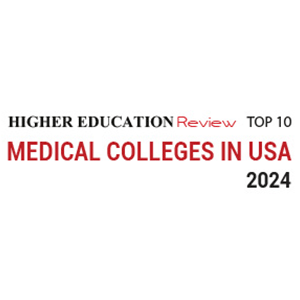Cover Story
Top 10 Medical Colleges In USA - 2024
Pathway to Medical Mastery: Shaping the Future of Medicine
Medical colleges play a pivotal role in shaping the healthcare landscape of the United States, producing the next generation of physicians, researchers, and healthcare leaders who will drive innovation and excellence in medical care. These institutions are the backbone of the healthcare system, ensuring a steady supply of highly trained professionals who are essential to addressing the nation’s complex and evolving medical needs. They are indispensable to the health and well-being of society. Their contributions to medical research, education, and healthcare equity make them a critical pillar of the US healthcare system and a vital area for investment and support from the business community.
Empowering Future Medical Leaders
Medical colleges contribute significantly to the advancement of medical knowledge through research. They are at the forefront of medical discoveries, developing new treatments, technologies, and approaches that improve patient care and outcomes. This continuous innovation is vital for maintaining the US’s leadership in global healthcare. They instill in future physicians the values of empathy, ethics, and patient-centered care. This holistic approach to medical education ensures that graduates are not only skilled practitioners but also compassionate caregivers who understand the broader social and ethical dimensions of healthcare. By training a diverse cohort of medical professionals, these institutions help to ensure that the healthcare workforce is representative of the communities it serves. This diversity is essential for culturally competent care and for reducing health disparities among different demographic groups. For business leaders, investing in and supporting medical colleges is a strategic imperative. A robust medical education system underpins a healthy workforce, which is a key driver of productivity and economic growth. Moreover, partnerships between businesses and medical colleges can spur innovation, leading to new medical technologies and treatments that have both health and economic benefits.
This issue of Higher Education Review talks about some of the professionally managed colleges in the country, which has been nurtured with best technical and professional infrastructure and assistance from efficient and skilled faculties ensuring delivery of quality higher education and research. This issue spotlights a list of ‘Top 10 Medical Colleges in USA – 2024’, the list has been crafted by a team of Industry veterans, CEOs, VCs and the Higher Education Review editorial team.
Top 10 Medical Colleges In USA - 2024
College |
Location |
Description |
|---|---|---|
| Drexel University College of Medicine | Philadelphia | The College seeks diverse students and encourages non-traditional applicants, it also serves the community through healthcare services and supports patient care, training, and research |
| New York Medical College | New York | The college manages research and other sponsored programs, notably in the areas of cancer, cardiovascular disease, infectious diseases, kidney disease, the neurosciences, disaster medicine, and vaccine development |
| Saint James School of Medicine | Park Ridge | The college has served the singular purpose of providing medical education at affordable prices and support students from obtaining a student visa to becoming licensed physicians |
| Texila American University | Georgetown | Offers a wide range of programs tailored to meet the diverse needs of students, provides flexible learning options, including distance & blended learning programs, ensuring that education is accessible to all individuals |
| The Ohio State University College of Medicine | Columbus | The college comprises of 19 clinical departments, seven basic science departments, and an exceptional school of health & rehabilitation sciences that provides undergraduate, masters, and PhD programs |
| University of Florida College of Medicine | Gainesville | The college also offers other graduate degree programs, including medical science, biomedical engineering, physician assistant studies and an interdisciplinary program in biomedical sciences |
| University of Illinois College of Medicine | Chicago | Offer a range of medical education programs for students with diverse needs, including graduate programs in basic science & clinical research, as well as continuing education for practicing physician |
| University of Pittsburgh School of Medicine | Pittsburgh | Provides world-class research and teaching, and is involved in transforming graduate education in the US, offers multiple graduate programs at both the PhD and MS levels |
| University of Washington School of Medicine | Seattle | Committed to excellence in training the next generation of physicians, researchers, and health professionals, offering programs such as phD, MD, Residency & fellowship programs and research programs |
| Wake Forest University School of Medicine | Winston-Salem | The organization aims to utilize its existing strengths and concentrate on enhancing the integration of its research initiatives in order to optimize multidisciplinary and translational methods |

.jpg)


